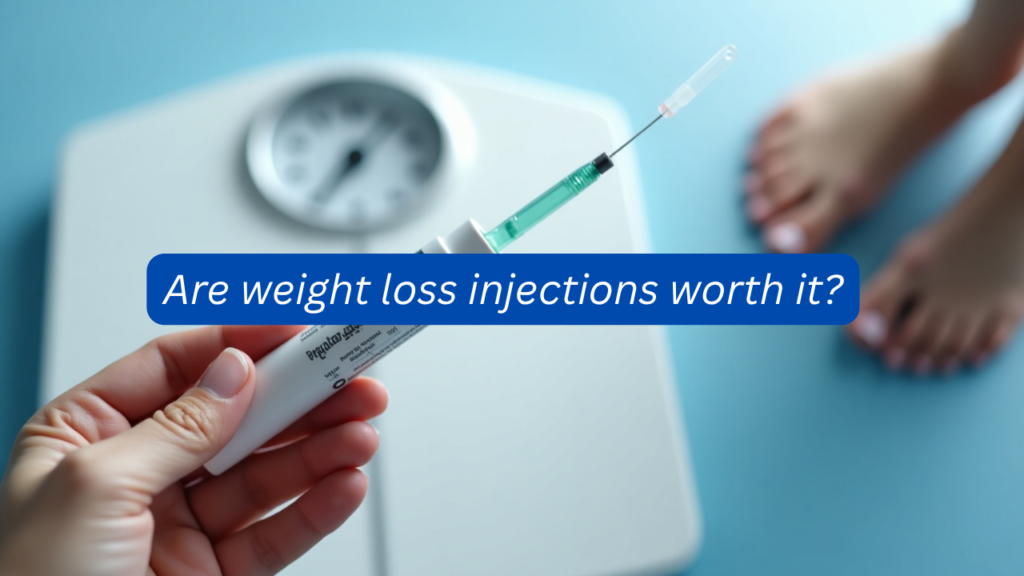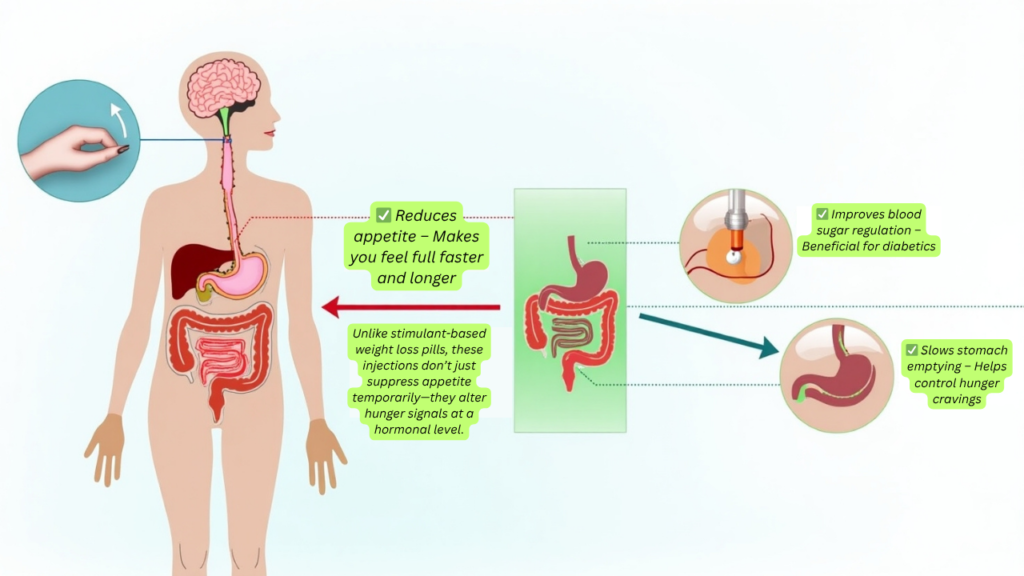Are weight loss injections worth it? This question has become increasingly common as more people turn to medical solutions for shedding excess pounds. With obesity rates rising globally and traditional weight loss methods often falling short, injectable medications like Semaglutide (Wegovy, Ozempic) and Liraglutide (Saxenda) have gained popularity. But do they really work, and are they a safe, long-term solution?
In this comprehensive guide, we’ll explore:
✔ How weight loss injections work
✔ Their effectiveness compared to diet and exercise
✔ Potential side effects and risks
✔ Who should (and shouldn’t) consider them
✔ Cost and accessibility
✔ Realistic expectations for results
By the end, you’ll have a clear answer to the question: Are weight loss injections worth it for you?
Table of Contents
ToggleHow Do Weight Loss Injections Work?
Most prescription weight loss injections belong to a class of drugs called GLP-1 receptor agonists. These medications mimic a natural hormone that:
✅ Reduces appetite – Makes you feel full faster and longer
✅ Slows stomach emptying – Helps control hunger cravings
✅ Improves blood sugar regulation – Beneficial for diabetics
Popular options include:
Semaglutide (Wegovy, Ozempic) – Weekly injection, FDA-approved for weight loss
Liraglutide (Saxenda) – Daily injection, also FDA-approved
Tirzepatide (Zepbound, Mounjaro) – Newer, dual-action injection
Unlike stimulant-based weight loss pills, these injections don’t just suppress appetite temporarily—they alter hunger signals at a hormonal level.
Effectiveness: Do Weight Loss Injections Really Work?
Clinical Results
Studies show impressive results:
Wegovy (Semaglutide): Patients lost 15-20% of body weight over 68 weeks (with diet/exercise changes).
Saxenda (Liraglutide): Average loss of 5-10% body weight in a year.
Zepbound (Tirzepatide): Some lost 20-25% of their weight in trials.
Compared to diet and exercise alone, these medications often lead to 2-3x more weight loss.
Real-World Success
Many users report:
✔ Reduced food cravings (especially for sweets and junk food)
✔ Easier portion control
✔ Improved metabolic health (lower blood sugar, cholesterol)
However, results vary—some lose weight rapidly, while others see slower progress.
Potential Side Effects and Risks
While effective, weight loss injections aren’t without drawbacks. Common side effects include:
Nausea, vomiting, diarrhea (usually temporary)
Constipation or heartburn
Fatigue or dizziness
Gallbladder issues (rare but serious)
Long-term risks (still being studied) may include:
❌ Muscle loss (if protein intake isn’t monitored)
❌ Pancreatitis (very rare but serious)
❌ Thyroid tumor risk (in animal studies, not confirmed in humans)
Who Should Avoid Them?
Pregnant/breastfeeding women
People with a history of medullary thyroid cancer
Those with severe gastrointestinal disorders
Always consult a doctor before starting.
Who Are Weight Loss Injections Best For?
These medications are not magic shots—they work best for:
✔ Obese individuals (BMI ≥ 30)
✔ Overweight people (BMI ≥ 27) with weight-related conditions (diabetes, high blood pressure)
✔ Those who’ve struggled with yo-yo dieting
✔ Patients needing extra help after bariatric surgery
If you only want to lose 5-10 lbs, lifestyle changes may be a better (and cheaper) option.
Cost and Accessibility: Are They Affordable?
One major downside? Price.
Wegovy/Ozempic: $900-$1,300/month without insurance
Saxenda: $1,000-$1,500/month
Zepbound: Around $1,000/month
Insurance Coverage?
Some plans cover them only for Type 2 diabetes (Ozempic/Mounjaro)
Wegovy and Saxenda may be covered if prescribed for obesity
Medicare does not cover weight loss medications
Alternatives?
Compounded semaglutide (cheaper but less regulated)
Appetite suppressant pills (less effective but more affordable)
Long-Term Outlook: What Happens After Stopping?
A critical question: Do you regain weight after stopping injections?
Unfortunately, many people do—studies show most regain a significant portion of lost weight within a year of stopping. Why?
Hunger hormones return to baseline
Old eating habits may resurface
Metabolism adjusts to lower weight
Solution?
Lifestyle changes must continue (healthy eating, exercise)
Some may need long-term maintenance doses
Behavioral therapy helps sustain results
Final Verdict: Are Weight Loss Injections Worth It?
Yes, if…
✔ You meet BMI/health criteria
✔ You’ve struggled with traditional weight loss
✔ You can afford them (or have insurance coverage)
✔ You’re committed to long-term lifestyle changes
No, if…
❌ You only want to lose a few pounds
❌ You expect a “quick fix” without effort
❌ You can’t handle potential side effects
❌ You’re not prepared for possible long-term use
The Bottom Line
Weight loss injections can be life-changing for the right candidates, but they’re not a standalone solution. Combined with diet, exercise, and behavioral changes, they offer a powerful tool—but only if used responsibly.
Consult a doctor to see if they’re right for you.


